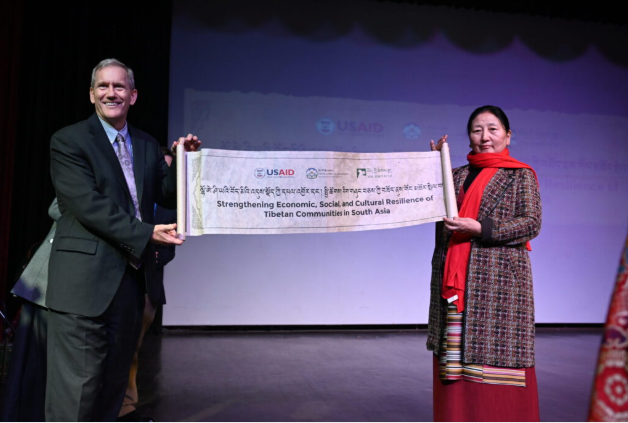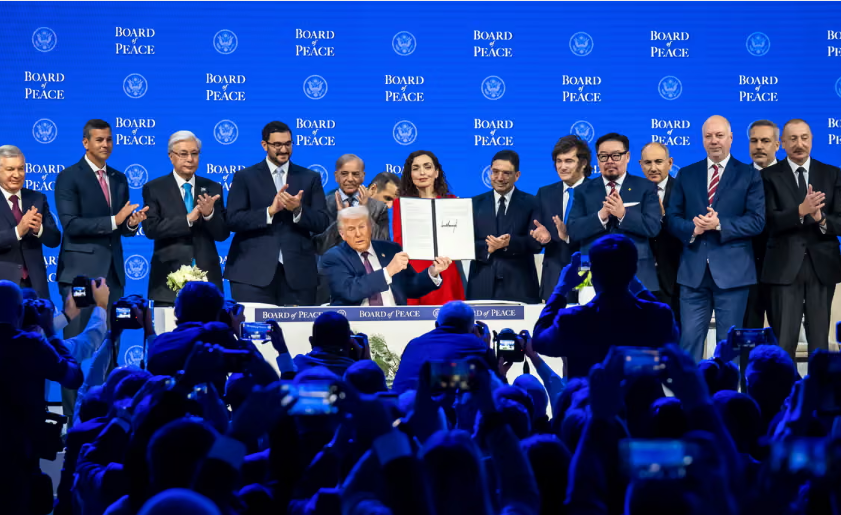Launch of a Five-Year Initiative to Boost Tibetan Communities’ Economic, Social, and Cultural Resilience in India and Nepal
Dharamshala: On 25 November 2024, USAID, in partnership with The Tibet Fund and the Central Tibetan Administration (CTA), launched a new programme aimed at strengthening the economic, social, and cultural resilience of Tibetan communities in India and Nepal. The event, held at the Tibetan Institute of Performing Arts, marked the introduction of this five-year programme.
The launch event was graced by Dr. Steven Olive, the new Mission Director of USAID, who has previously held similar roles across three continents. He was accompanied by seven colleagues from the USAID Mission for India and Bhutan. Bob Ankerson, President of The Tibet Fund, and his team also attended in support of the initiative.
From the Tibetan leadership, officiating Sikyong Tharlam Dolma Changra, the Kalon (Minister) of the Department of Education, and Deputy Speaker Dolma Tsering Teykhang, along with Secretaries and deputised Secretaries from the departments of the Central Tibetan Administration, were present at the launch ceremony. Other notable attendees included Secretaries from the Office of His Holiness the Dalai Lama and Directors of the Tibetan Medical and Astrology Institute, the Tibetan Institute of Performing Arts, the Tibetan Children’s Village School, and the Monlam IT Research Center.
The ceremony commenced with the official unveiling of the Tibetan Economic, Social, and Cultural (TESC) programme by Mission Director Dr. Steven Olive, officiating Sikyong Tharlam Dolma Changra, and The Tibet Fund President Bob Ankerson.
In his opening remarks, Bob Ankerson outlined the objectives of the programme, highlighting how it aligns with Kashag’s vision paper and supports His Holiness the Dalai Lama’s noble commitment to preserving the Tibetan language and culture.
Secretary Jigme Namgyal (Department of Education), Secretary Jampa Phuntsok (Department of Health), Secretary Tsering Dhondup (Department of Finance), and Joint Secretary Tenzin Khenrab (representing the Secretary of the Department of Home) each delivered short presentations. They expressed their heartfelt gratitude to USAID for its ongoing support in preserving and promoting Tibetan cultural identities in exile. The Secretaries acknowledged USAID’s significant contributions, particularly in the areas of education, healthcare, and overall livelihood, as well as emphasised how these efforts have helped strengthen the community’s resilience and uplifted living standards for Tibetans in exile.
Officiating Sikyong Tharlam Dolma Changra, in her address, expressed her sincere gratitude to the governments and people of India and the United States for their generous support. The officiating Sikyong spoke about how, over the past 65 years, Tibetans have managed to preserve and promote their culture in exile under the visionary leadership of His Holiness the Dalai Lama.
As the Kalon of the Department of Education, officiating Sikyong Tharlam Dolma Changra took particular pride in the incorporation of SEE Learning (Social, Emotional, and Ethical Learning) in the Tibetan education system, which has contributed to the holistic education of younger Tibetans. She emphasised how these efforts have helped produce educated and capable young Tibetans who were now scattered across the globe shouldering responsibilities of Tibetan freedom struggle.
In his keynote address, Dr. Steven Olive expressed his admiration for the resilience of the Tibetan community. He remarked, “It’s been an amazing day for me to visit the library, view the museum, and hear your aspirations. It’s inspiring to see how far you’ve come, especially in the last decade, thanks to our strong partnership with USAID and the Tibetan communities.”
Dr. Olive acknowledged, “The United States stands with you in preserving Tibetan culture, enhancing economic opportunities, and fostering resilience for a self-reliant future.” He also emphasised the bipartisan support for the Tibetan community in the United States, stating, “Regardless of political party or political thought in the United States, there is strong commitment to the Tibetan communities around the world.”
Dr. Olive further emphasised, “Building on our partnership spanning more than two decades, our gathering today is a testament to the strength of our shared commitment to the Tibetan community and the vision we hold for its future, which aligns with the vision of the Central Tibetan Authority.” He also recalled his previous work as the Mission Director for the Regional Development Mission for Asia, based in Bangkok, where his team implemented programmes for Tibetan communities inside Tibet.
The ceremony concluded with several auspicious Tibetan religious dances and cultural performances of Tibet’s three traditional provinces by TIPA artistes, presented in honour of the visiting guests.
The event wrapped up with a vote of thanks from Sherab Woeser, Chief of the Party for the TESC programme, and a dinner reception followed the launch event.













